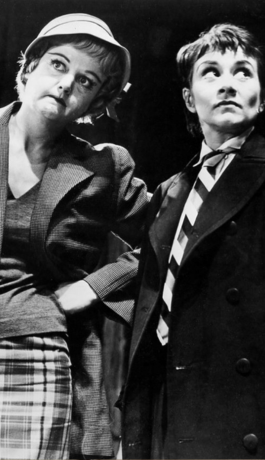A Revolutionary Voice in British Theatre
When eighteen-year-old Shelagh Delaney wrote “A Taste of Honey” in just ten days in 1958, she couldn’t have known she was about to revolutionize British theatre. Yet this raw, unflinching portrayal of working-class life in post-war Salford would become one of the defining plays of the “kitchen sink” movement and pave the way for countless working-class voices in British drama.
Quick Facts
- First performed: 1958 at Theatre Workshop, Stratford East
- West End transfer: 1959, Wyndham’s Theatre
- Broadway debut: 1960, Lyceum Theatre
- Runtime: Approximately 2 hours and 15 minutes
- Structure: Two acts
- Notable adaptations: 1961 film directed by Tony Richardson, starring Rita Tushingham
- Awards: Tony Award nomination for Best Play (1961)
Just want to read the play?
Free version? Try the BBC Radio version on YouTube: https://www.youtube.com/watch?v=EENVTTCoNuc
Historical Context
“A Taste of Honey” emerged during a pivotal moment in British social history. The late 1950s saw Britain still grappling with post-war austerity while simultaneously experiencing the first tremors of social revolution. The welfare state was in its infancy, abortion was illegal, homosexuality was criminalized, and mixed-race relationships were taboo. Against this backdrop, Delaney’s play wasn’t just dramatic – it was radical.
Written in the same era as John Osborne’s “Look Back in Anger,” the play formed part of the British New Wave that sought to represent working-class life authentically on stage. However, while her male contemporaries were praised as angry young men, Delaney was often dismissed as a naive young woman who had accidentally written a masterpiece – an assessment that says more about the period’s sexism than her talent.
Plot Overview
The play follows Jo, a seventeen-year-old schoolgirl, and her relationship with her semi-prostitute mother Helen in working-class Salford. When Helen runs off with her younger lover Peter, Jo finds brief happiness with Jimmy, a black sailor who leaves her pregnant. She then moves in with Geoffrey, a gay art student who becomes her surrogate family until Helen’s return threatens their unconventional domestic arrangement.
What makes the plot revolutionary isn’t just its content but its matter-of-fact treatment of previously taboo subjects: interracial relationships, teenage pregnancy, single motherhood, and homosexuality. There’s no moralizing, no punishment for “transgressive” behavior – just life, presented with unflinching honesty and unexpected humor.
Themes & Analysis
Class and Gender
Delaney’s portrayal of working-class women was unprecedented in its honesty. Helen and Jo aren’t tragic victims or comic relief – they’re complex, flawed human beings fighting for survival in a system stacked against them. Their relationship is both destructive and tender, marked by the cycle of poverty and limited opportunities available to working-class women.
Unconventional Family Structures
The play dismantles the notion of the traditional nuclear family. Jo creates her own family unit with Geoffrey, challenging contemporary notions of what constitutes a “proper” household. The arrangement between a pregnant teenager and a gay man offers more stability and genuine care than any conventional relationship in the play.
Love and Abandonment
Every character in “A Taste of Honey” experiences both love and abandonment. Jimmy leaves Jo pregnant, Helen repeatedly abandons her daughter, and society has abandoned them all. Yet within this cycle of desertion, moments of genuine connection emerge – particularly between Jo and Geoffrey.
Revolutionary Elements
What makes “A Taste of Honey” truly revolutionary is its voice. Delaney’s dialogue crackles with working-class authenticity, yet soars into moments of poetic beauty. The play’s structure, mixing naturalistic scenes with musical interludes and direct address to the audience, was innovative for its time and remains striking today.
The play’s treatment of sexuality was groundbreaking. Geoffrey’s homosexuality isn’t treated as scandalous or tragic – it’s simply part of who he is. Similarly, Jo’s relationship with Jimmy isn’t presented as a moral issue but as a love story that happens to cross racial boundaries.
Cultural Impact
“A Taste of Honey” influenced generations of British dramatists, from Edward Bond to Andrea Dunbar. Its impact extended beyond theatre – the 1961 film adaptation helped launch the British New Wave in cinema, while The Smiths’ Morrissey cited Delaney as a major influence, even using her image on album covers.
The play’s significance in British theatre history cannot be overstated. It helped establish the Royal Court Theatre’s reputation for progressive drama and proved that working-class stories, particularly those of women, deserved their place on stage.
Reading Guide
Best Editions
- Methuen Drama Student Edition (includes excellent commentary)
- Faber & Faber Edition (includes Delaney’s introduction)
Reading Tips
- Pay attention to the stage directions – they’re often poetic and revealing
- Notice how music is integrated into the text
- Watch for the moments of unexpected humor
- Consider how the setting becomes a character in itself
Contemporary Relevance
Though rooted in 1950s Salford, the play’s themes remain startlingly relevant. Issues of class mobility, single parenthood, and the search for family continue to resonate. Its exploration of how people create families outside traditional structures feels particularly pertinent to contemporary discussions of chosen families in LGBTQ+ communities.
The play’s unflinching look at poverty and its impact on women’s choices continues to speak to audiences today. As debates about class, opportunity, and social mobility persist, Jo’s story remains powerfully relevant.
Fun Facts & Trivia
- Delaney wrote the play after seeing Terence Rattigan’s “Variation on a Theme” and deciding she could do better
- The original Theatre Workshop production was directed by Joan Littlewood, who helped shape the play
- The title comes from a poem by Shelagh Delaney’s favorite writer, Federico García Lorca
- The play’s success allowed Delaney to buy her parents their first house
Why This Play Matters
“A Taste of Honey” matters not just for what it says, but for who says it. It’s the voice of a working-class teenage girl speaking her truth without apology or explanation. It’s a play that changed what was possible in British theatre and continues to demonstrate the power of authentic, uncompromising storytelling.
Its greatest achievement might be its humanity – the way it presents characters usually relegated to stereotypes or tragedy and allows them to be fully, messily human. In doing so, it reminds us that every life contains moments of both hardship and sweetness – a taste of honey amid the bitter.
Additional Resources
- “Shelagh Delaney’s Manchester” (BBC Documentary)
- “The Joan Littlewood Theatre Workshop” by Robert Leach
- “Modern British Drama: The Twentieth Century” by Christopher Innes
- Original reviews from Kenneth Tynan and Harold Hobson
As you read “A Taste of Honey,” remember: you’re not just reading a play – you’re experiencing a pivotal moment in theatrical history, when a teenage girl from Salford helped change the voice of British theatre forever.




